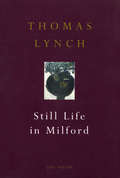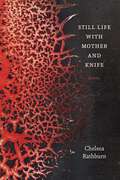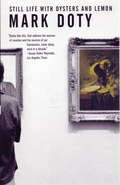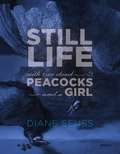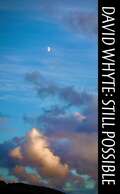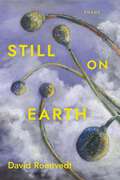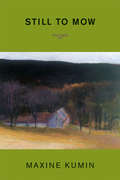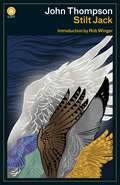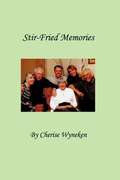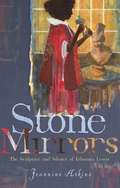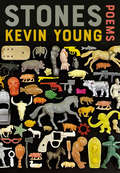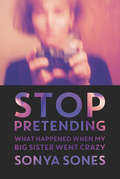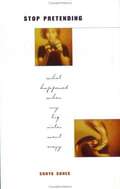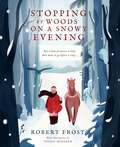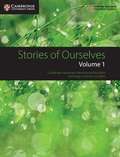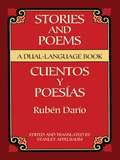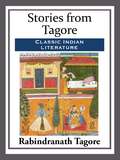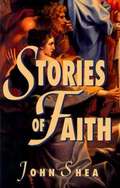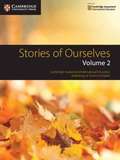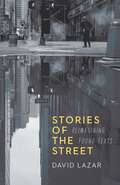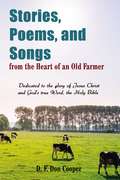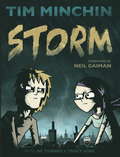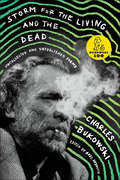- Table View
- List View
Still Life In Milford
by Thomas LynchIn Still Life in Milford, Lynch casts the cold eye we are told to on life and death, history and memory, the local and the larger geographics. Examining the dynamics of faith, remembrance, and intimate conduct, these poems are informed by end times, tribulations and visions that make up the ordinary enterprise of daily life. Colloquy and narrative, soliloquy and tribute, Still Life in Milford engages the full register of the poet's voices as elegist, eulogist, obituarist, straight man and passer-by to achieve a difficult and inimitable harmony.
Still Life with Mother and Knife: Poems
by Chelsea RathburnIn this powerful collection, Chelsea Rathburn seeks to voice matters once deemed unspeakable, from collisions between children and predators to the realities of postpartum depression. Still Life with Mother and Knife considers the female body, “mute and posable,” as object of both art and violence. Once an artist’s model, now a mother, Rathburn knows “how hard / it is to be held in the eyes of another.” Intimate and fearless, her poems move in interlocking sections between the pleasures and dangers of childhood, between masterpieces of art and magazine centerfolds, and—in a gripping sequence in dialogue with Delacroix’s paintings and sketches of Medea—between the twinned ferocities of maternal love and rage. With singular vision and potent poetic form, Rathburn crafts a complex portrait of girlhood and motherhood from which it is impossible to look away.
Still Life with Oysters and Lemon: On Objects and Intimacy
by Mark DotyMark Doty's prose has been hailed as "tempered and tough, sorrowing and serene" (The New York Times Book Review) and "achingly beautiful" (The Boston Globe). In Still Life with Oysters and Lemon he offers a stunning exploration of our attachment to ordinary things-how we invest objects with human store, and why.From the Trade Paperback edition.
Still Life with Two Dead Peacocks and a Girl: Poems
by Diane SeussFinalist for the National Book Critics Circle AwardFinalist for the Los Angeles Times Book PrizeDiane Seuss’s brilliant follow-up to Four-Legged Girl, a finalist for the Pulitzer Prize for PoetryStill life with stack of bills phone cord cig butt and freezer-burned DreamsicleStill life with Easter Bunny twenty caged minks and rusty meat grinderStill life with whiskey wooden leg two potpies and a dead parakeetStill life with pork rinds pickled peppers and the Book of RevelationStill life with feeding tube oxygen half-eaten raspberry ZingerStill life with convenience store pecking order shotgun blast to the face—from “American Still Lives”Still Life with Two Dead Peacocks and a Girl takes its title from Rembrandt’s painting, a dark emblem of femininity, violence, and the viewer’s own troubled gaze. In Diane Seuss’s new collection, the notion of the still life is shattered and Rembrandt’s painting is presented across the book in pieces—details that hide more than they reveal until they’re assembled into a whole. With invention and irreverence, these poems escape gilded frames and overturn traditional representations of gender, class, and luxury. Instead, Seuss invites in the alienated, the washed-up, the ugly, and the freakish—the overlooked many of us who might more often stand in a Walmart parking lot than before the canvases of Pollock, O’Keeffe, and Rothko. Rendered with precision and profound empathy, this extraordinary gallery of lives in shards shows us that “our memories are local, acute, and unrelenting.”
Still Possible
by David WhyteThe poems in Still Possible pay homage to the invisible passage of time - the deep, private current that wends through our lives as a steadfast companion, sculpting our interior worlds as inexorably and exquisitely as its visible manifestations. Whyte turns his eye, and his pen, to the possibilities and harvests this shaping reveals: the shyness and vulnerability of love, the illusion of imperfection, and the new invitations that beckon along the way. The poems reflect an abiding faith in time's wisdom: a journey turned away from in youth waits patiently for later maturity; an early experience ripens in secret to reveal, decades later, a full understanding. Under Whyte's poet-philosopher gaze, a rain-soaked day in an Irish farmhouse becomes a meditation on the essence of a truly good day: a settled contentment, alert and open to whatever may call. Plus, sheep, Seamus Heaney and a dog. Powerful language rests on a foundationof what isn't said, a silence underpinning the eloquence of articulation. In this way, Still Possible hovers above the numinous and the unknowable - what we pray for, what we pass on, what mystery awaits and, in the end, what it might mean to be happy.
Still on Earth: Poems
by David RomtvedtWith Still on Earth, David Romtvedt addresses the sometimes disconcerting, sometimes thrilling, and, if we accept the writer’s premise, always wacky crossings experienced by figures identified as the person, the poet, and the angel. All three intersect and collide with the society and culture within which they exist, prompting speculation that uncertainty could be preferable to knowing. Romtvedt’s delightfully plainspoken and immediate poems probe the mysterious purpose of our stay on earth with humor, candor, and grace. A poem, the father in the book argues, is worth next to nothing. And while the son disagrees, having experienced transformation through language, he also recognizes that the poem cannot buy the groceries and pay the rent. Or perhaps it can and it’s just tricky. After having devoted years to writing, the poet remains uncertain and speculates that uncertainty is not so bad and is preferable to knowing.Between the person and the poet, Still on Earth presents the angel who seems to have the same father that the person and the poet had. The two fathers are too close for comfort. For the angel, we must imagine a being with no experience of the physical suddenly confronted with the demands of the body, a being both naïve and worldly—otherworldly. The angel has been here before. In Romtvedt’s reckoning, we all have. It’s just hard to remember.
Still to Mow: Poems
by Maxine Kumin"Kumin writes ... with the clear gaze of a journalist and the ire of an activist.... Filled with love."--Christian Science Monitor Here Maxine Kumin's signature nature poems are shaken up and invigorated by the darker, human realities. Both "delicate and powerful" (Library Journal), she faces with equanimity the disappointments and joys of sixty years of marriage--ending with the unspoken question of "Which of us will go down first."
Stilt Jack (A List)
by John ThompsonThe much-loved, yet undervalued, final book of poems by British-Canadian poet John Thompson, is reissued in a handsome edition, featuring a new introduction by Rob Winger.Originally published in 1978, Stilt Jack is a series of powerful soliloquies on the complexity of love and the process of living. These are made immediate through Thompson’s command of metaphor, his eye for the New Brunswick landscape, his intense, often elliptical way of transfiguring everyday things into shorthand symbols of reality. This remarkable sequence of poems is based on the ghazal, an ancient Persian poetic form which is discussed in Thompson’s introduction to the original edition of the book.These poems more than fulfill the promise of Thompson’s first collection, At the Edge of the Chopping There Are No Secrets. Stilt Jack is the last testament of a major poet at the pinnacle of his craft.
Stir-fried Memories
by Cherise WynekenLike a Chinese menu, Stir-fried Memories serves tasty morsels that appeal to a variety of interests. It is a collection of essays and personal experience pieces combined much like vegetables are mixed together in a wok for a tasty stir-fried meal heaped with flavor, color, nutrition, and fragrance. It offers readers a taste of living through humor, travel, childhood, major moves, sickness, death, and family. Cherise Wyneken is a freelance writer and weekly columnist on poetry for the Oakland online version of the Examiner. Selections of her prose and poetry have appeared in over two hundred journals, periodicals, and anthologies, as well as two collections of poetry, two chapbooks, a memoir, a novel, and a children’s book.
Stone Mirrors: The Sculpture and Silence of Edmonia Lewis
by Jeannine AtkinsFrom critically acclaimed author Jeannine Atkins comes a gorgeous, haunting biographical novel in verse about a half Native American, half African American sculptor working in the years following the Civil War.A sculptor of historical figures starts with givens but creates her own vision. Edmonia Lewis was just such a sculptor, but she never spoke or wrote much about her past, and the stories that have come down through time are often vague or contradictory. Some facts are known: Edmonia was the daughter of an Ojibwe woman and an African-Haitian man. She had the rare opportunity to study art at Oberlin, one of the first schools to admit women and people of color, but lost her place after being accused of poisoning and theft, despite being acquitted of both. She moved to Boston and eventually Italy, where she became a successful sculptor. But the historical record is very thin. The open questions about Edmonia’s life seem ideally suited to verse, a form that is comfortable with mysteries. Inspired by both the facts and the gaps in history, author Jeannine Atkins imagines her way into a vision of what might have been.
Stones: Poems
by Kevin YoungA book of loss, looking back, and what binds us to life, by a towering poetic talent, called "one of the poetry stars of his generation" (Los Angeles Times)."We sleep long, / if not sound," Kevin Young writes early on in this exquisite gathering of poems, "Till the end/ we sing / into the wind." In scenes and settings that circle family and the generations in the American South--one poem, "Kith," exploring that strange bedfellow of "kin"--the speaker and his young son wander among the stones of their ancestors. "Like heat he seeks them, / my son, thirsting / to learn those / he don't know / are his dead." Whether it's the fireflies of a Louisiana summer caught in a mason jar (doomed by their collection), or his grandmother, Mama Annie, who latches the screen door when someone steps out for just a moment, all that makes up our flickering precarious joy, all that we want to protect, is lifted into the light in this moving book. Stones becomes an ode to Young's home places and his dear departed, and to what of them—of us—poetry can save.
Stop Pretending
by Sonya SonesIt happens just like that, in the blink of an eye. An older sister has a mental breakdown and has to be hospitalized. A younger sister is left behind to cope with a family torn apart by grief and friends who turn their backs on her. But worst of all is the loss of her big sister, her confidante, her best friend, who has gone someplace no one can reach.In the tradition of The Bell Jar, I Never Promised You a Rose Garden, and Lisa, Bright and Dark comes this haunting first book told in poems, and based on the true story of the author's life. 2000 Best Books for Young Adults (ALA) and 2000 Quick Picks for Young Adults (Recomm. Books for Reluctant Young Readers)
Stop Pretending: What Happened When My Big Sister Went Crazy
by Sonya SonesIt happens just like that, in the blink of an eye. An older sister has a mental breakdown and has to be hospitalized. A younger sister is left behind to cope with a family torn apart by grief and friends who turn their backs on her. But worst of all is the loss of her big sister, her confidante, her best friend, who has gone someplace no one can reach. In the tradition of "The Bell Jar," "I Never Promised You a Rose Garden" and "Lisa, Bright and Dark" comes this haunting first book told in poems, and based on the true story of the author's life.
Stopping By Woods on a Snowy Evening
by Robert FrostAn illustrated interpretation of Robert Frost&’s classic poem of loss, family bonds, and promises to keep.
Stories Of Ourselves: Cambridge Assessment International Education Anthology Of Stories In English (Cambridge International Examinations Ser.)
by University of Cambridge ESOL ExaminationsThis series contains poetry and prose anthologies composed of writers from across the English-speaking world. Parts of Stories of Ourselves Volume 1 are set for study in Cambridge IGCSE®, O Level and International AS & A Level Literature in English courses. Each short story in this collection has its own unique voice and point of view. They may differ in form, genre, style, tone and origin, but all have been chosen because of their wide appeal. Written in English by authors from different countries and cultures, the anthology includes works by Charles Dickens, H.G. Wells, Virginia Woolf, Graham Greene, V.S. Naipaul, R.K Narayan, Janet Frame, Raymond Carver, Jhumpa Lahiri, Annie Proulx and many others.
Stories and Poems/Cuentos y Poesías: A Dual-Language Book
by Rubén Darío Stanley AppelbaumNicaraguan poet and essayist Darío (the pen name of Félix Rubén García Sarmiento) is considered the high priest of the modernismo school of literature. This volume contains a rich selection of his best poems and stories from Azul (Blue), Prosas profanas (Worldly Hymns), and others. Accurate English translations appear on the facing pages.
Stories from Tagore
by Rabindranath TagoreCollected here are ten wonderful traditional Indian stories as told by Rabindranath Tagore. The language is rich and the narrative compelling. Tagore was one of the greatest poets of the twentieth Century, and that lyrical quality comes through in all of his work.
Stories of Faith
by John SheaThe book is spiritually deep, thought-provoking treatise on making Jesus' story our own. It includes sections of beautiful and meditative poetry. From the book introduction: This book is a meditation on the dual drives of Christian faith: toward God and toward Jesus. How do we get to God and, more importantly, how do we get back? How do we contact the vitality of Jesus that generated the Christian movement and what happens to us once contact is made? Faith has the reputation of being a chameleon word. Its meaning changes with the environment. But no matter what transformations occur, God and Jesus are the constant center.
Stories of Ourselves Volume 2: Cambridge Assessment International Education Anthology of Stories in English (Cambridge International Examinations)
by Mary WilmerThis series contains poetry and prose anthologies composed of writers from across the English-speaking world. Stories of Ourselves Volume 2 is a set text for Cambridge IGCSE®, O Level and International AS & A Level Literature in English courses. The anthology contains short stories written in English by authors from many different countries and cultures, including Charles Dickens, Virginia Woolf, Christina Rossetti, Janet Frame, Jhumpa Lahiri, Romesh Gunesekera, Segun Afolabi, Margaret Atwood and many others. Classic writers appear alongside new voices from around the world in a stimulating collection with broad appeal.
Stories of the Street: Reimagining Found Texts
by David LazarWhen walking down the street, it is not uncommon to see lost items that have escaped their proper receptacles, but how often does one stop to read the messages left behind? David Lazar has stopped often, capturing the pieces of a &“lost world on the streets&” and thinking about the life of the discarder from the fragments left behind.Stories of the Street is a series of imaginative meditations—through prose poems, short-short essays, microfictions, and prose pieces without precise genre distinction—of what it means to encounter lost or discarded texts. Rather than simply deconstructing the lists, notes, receipts, or book pages he finds strewn in various cities, Lazar uses them as suggestive, capable of inspiring possible narratives that are at most latent in the text itself. The encounter, then, is an encounter with oneself and the mysteries of cities, where detritus frequently doubles as a sign saying, &“Consider this.&” Lazar&’s narrative voice ranges in tone from the comically antic to the melancholy. By photographing what he describes as &“messages that had escaped their bottles&” on-location as found, Lazar has become a flaneur of paper debris, puzzling over the evidence of urban human life.
Stories, Poems, and Songs from the Heart of an Old Farmer: Dedicated to the glory of Jesus Christ and GodÆs true Word, the Holy Bible
by Don CooperThis book is a compilation of stories, poems, and song lyrics which really do come from the heart of a former dairy farmer who sincerely desires to share his love for Jesus and God's true Word, the Holy Bible, with you. It tells of our faith and experiences during our time as dairy farmers and how those two intertwined."Dedicated to glory of Jesus Christ and God&’s True Word, the Holy Bible" is Don's mission statement, and throughout all of his writings he tells how the Lord has been at his side throughout his whole life. Without His presence Don could have never done the seemingly impossible things he's done.
Storm
by Tim MinchinA storm is brewing in the confines of a London dinner party. Small talk quickly descends into a verbal and intellectual battle between science and belief, as comedian Tim goes head to head with the mysterious fifth guest at the table - a hippy named Storm.With stunning original artwork, Tim's sublime ranty beat-poem weaves through the world we live in, where alternative medicine is given credence and public funding, psychics have primetime TV exposure and people are happy with mystery rather than answers.While Storm herself may not be converted, audiences from London to Sydney have been won over by Tim's lyrical wonders and the timely message of the piece in a society where science is attacked as the enemy of belief. STORM is the illustrated book born from the acclaimed internet sensation - the animation that has become an anthem for critical thinking worldwide, attracting over three million views. Now fully reimagined, STORM is a masterpiece that sparkles with beauty, wit, reason and rationality.Watch the video here: http://bit.ly/1s2DUuU
Storm Against the Innocents: Holocaust Memories and Other Stories
by Elly GrossIn 1998 Elly Gross, née Berkovits saw a picture on a display in Poland that changed the direction of her life. This book would not have been written if Elly had not seen that picture. Other life-changing events included separation at the age of 15 from her mother and 5 year old brother and incarceration as an inmate and slave laborer at Auschwitz-II/Birkenau. She survived; her family was murdered. After liberation, she began a new family with a survivor of the Death March. In 1966, they fled from communist Romania to the United States. She, her husband, and two children worked hard to attain the American Dream. Then in 1998, she participated, for the first time, in the March of the Living, a program where teenagers and survivors visit Jewish sites in Poland and Israel. At Auschwitz-II/Birkenau, there was a picture of a group of woman and children, just off the cattle cars, whose lives were soon to be snuffed out. In that picture, Elly found her mother and brother. This "reunification" is the touchstone from which so much of Elly's poetry and narratives pour. The history she writes about, from the Holocaust to the attack on the World Trade Center, is horrific. Elly, the innocent child, saved through a series of miracles or accidents, becomes Elly, the survivor-adult. As her legacy, she shares the feelings and facts of the time period with her readers. Her writing is a memorial to her family, as well as a commitment against hatred and the destruction to which it leads. To read this book is a memorable and touching experience. There are moments described that the reader will not forget, because they are not meant ever to be forgotten.
Storm for the Living and the Dead: Uncollected and Unpublished Poems
by Charles BukowskiA timeless selection of some of Charles Bukowski’s best unpublished and uncollected poemsCharles Bukowski was a prolific writer who produced countless short stories, novels, and poems that have reached beyond their time and place to speak to generations of readers all over the world. Many of his poems remain little known, material that appeared in small magazines but was never collected, and a large number of them have yet to be published. In Storm for the Living and the Dead, Abel Debritto has curated the very finest of this material—poems from obscure, hard-to-find magazines, as well as from libraries and private collections all over the country—most of which will be new to Bukowski’s readers and some of which has never been seen before. In doing so, Debritto has captured the essence of Bukowski’s inimitable poetic style—tough and hilarious but ringing with humanity. Storm for the Living and the Dead is a gift for any devotee of the Dirty Old Man of American letters.
